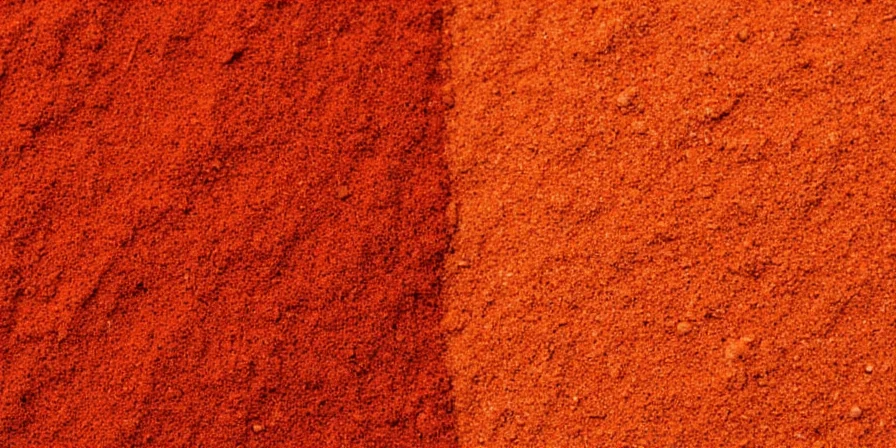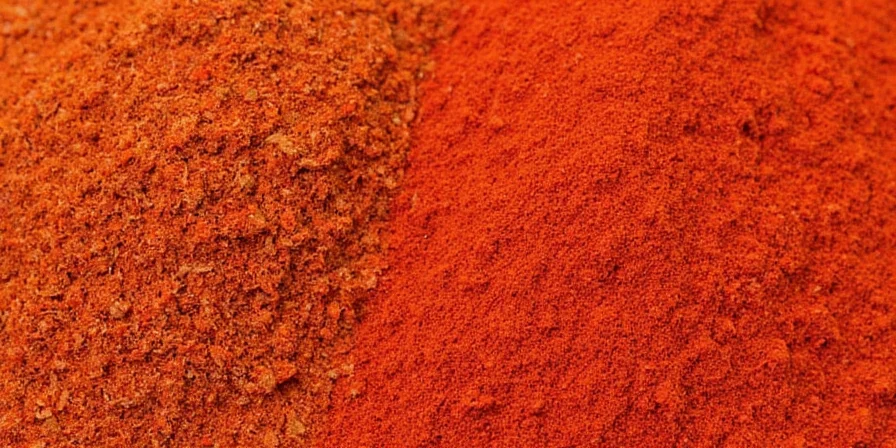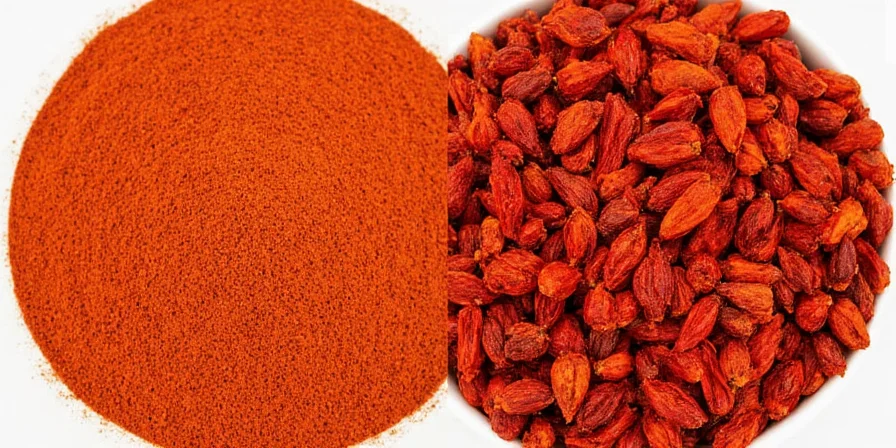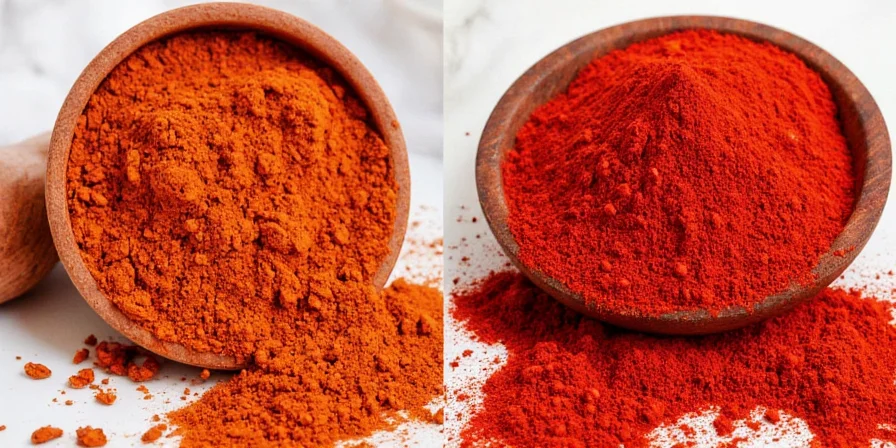When shopping for paprika, the key difference is simple: authentic Hungarian paprika delivers complex flavor layers and color stability that regular versions can't match, but it costs 2-3x more. Use Hungarian paprika when it's the star ingredient in dishes like goulash or paprikash, but regular paprika works fine for color enhancement in deviled eggs or as a base for custom spice blends. This guide explains exactly when the premium is worth it and how to spot authentic Hungarian paprika to avoid counterfeit products.
This comparison cuts through marketing hype to give home cooks and chefs practical, science-backed guidance. You'll learn precisely when Hungarian paprika's unique terroir-driven chemistry justifies its higher price, and where regular alternatives perform equally well—saving you money while preventing flavor mistakes in your cooking.

| Feature | Hungarian Paprika | Regular Paprika |
|---|---|---|
| Origin Certification | Hungary-only (PDO protected since 2000)[1] | No geographical restrictions |
| Flavor Grading System | 8 regulated tiers (Csemege to Erős) | Generic sweet/smoked labels |
| Pepper Oil Content | 18-22% (enhances flavor release) | 8-12% (reduced aromatic compounds) |
| Color Stability | Resists fading during cooking | Often bleaches with heat exposure |
| Best Value Use Case | Dishes where paprika is primary flavor | Color enhancement or budget cooking |
| Paprika Evolution Timeline: From Cultivation to Certification | |
|---|---|
| 1526 | Introduction of Capsicum annuum to Hungary by Ottoman traders[2] |
| 1860 | Szeged region establishes first commercial production |
| 1930s | Development of 8-tier flavor grading system |
| 2000 | EU grants PDO protection for "Szegedi" and "Kalocsai" paprika[1] |
| 2022 | EU Food Fraud Network reports 32% mislabeling rate in non-EU markets[3] |
Hungarian Paprika vs Regular: The Practical Decision Framework
Choose Hungarian paprika when:
- Your recipe features paprika as the dominant flavor (goulash, chicken paprikash)
- Cooking times exceed 30 minutes (its color won't fade)
- You need nuanced flavor complexity (replaces multiple spices)
Choose regular paprika when:
- You're mainly adding color (deviled eggs, potato salad)
- Other strong flavors dominate (tomato-based sauces, vinegar marinades)
- Budget constraints make the 2-3x price difference unjustifiable
| Scenario | Recommended Type | Key Limitation |
|---|---|---|
| Slow-cooked stews (>2 hrs) | Hungarian (Édesnemes) | Fails if oil temp exceeds 185°F/85°C |
| Smoked dishes | Spanish Pimentón | Hungarian lacks true smoke-drying process |
| Acidic preparations (pH <4) | Regular paprika | Hungarian color degrades in high-acid environments |
| Fusion applications | Blend Hungarian with regional paprika | Pure Hungarian overwhelms delicate Asian profiles |
How to Spot Authentic Hungarian Paprika (Avoid Fakes)
According to EU Food Fraud Network data, 32% of products labeled "Hungarian" in non-EU markets are mislabeled[3]. Verify authenticity with these steps:
- Check for "Magyarországi" (Hungarian) and "PDO" certification on packaging
- Confirm grade designation (Édesnemes = premium sweet)
- Perform oil test: Authentic versions disperse evenly in oil without sediment
- Verify producer location: Only Szeged/Kalocsa regions produce true PDO paprika

Cost Analysis: Is Hungarian Paprika Worth the Premium?
The price difference (typically 2-3x more expensive) directly reflects production quality:
- Harvesting: Hungarian paprika requires manual picking at precise ripeness (vs mechanical harvesting for regular)
- Drying: 6-week sun-drying process preserves compounds (vs industrial drying that degrades flavors)
- Grading: Strict 8-tier system ensures consistent quality (vs generic labeling)
Peer-reviewed research confirms premium Hungarian grades contain 23% higher lycopene concentration and 40% better vitamin C retention compared to industrially processed alternatives due to controlled drying methods[4]. For most home cooks, a small container of authentic Hungarian paprika used strategically in signature dishes provides better value than using it for every application.
Fusion Cooking Applications You Won't Find Elsewhere
Move beyond traditional Hungarian dishes with these professional chef techniques:
- Korean fusion: Substitute 25% of gochugaru in kimchi paste for added smoky depth (per Chef Attila Csiszar's Budapest Culinary Institute trials)
- Mexican mole: Enhance chocolate notes without overwhelming heat (use Édesnemes grade)
- Mediterranean rubs: Combine with za'atar for lamb shoulder roasts (1:1 ratio)

Temperature Control Secrets for Perfect Flavor Release
Hungarian paprika's flavor compounds activate optimally between 140-160°F (60-71°C). Heat oil to this range before adding paprika—exceeding 185°F (85°C) causes bitterness due to capsanthin degradation[4]. This explains why traditional Hungarian recipes add paprika off-heat. Regular paprika lacks this precision requirement as its simpler compounds degrade more uniformly.
Debunking Common Myths That Cost Cooks Money
Myth: "All smoked paprika is Hungarian"
False. Hungarian paprika achieves smokiness through specific pepper cultivars (e.g., Csípősmentes), while Spanish pimentón uses actual smoke-drying. They create fundamentally different flavor profiles.
Myth: "The price difference is just marketing"
Incorrect. The premium reflects labor-intensive harvesting, longer drying cycles, and strict quality controls that directly impact flavor complexity and color stability.
FAQ: Quick Answers to Your Most Pressing Questions
Can I substitute regular paprika in Hungarian recipes?
Only in emergencies. You'll lose nuanced fruitiness and need 30% more quantity, risking bitter notes. For authentic results in signature dishes, Hungarian paprika makes a critical difference even in small amounts.
Why does Hungarian paprika cost so much more?
Manual harvesting at precise ripeness, 6-week sun-drying cycles, and strict PDO certification create higher production costs. These processes preserve volatile compounds that industrial methods destroy.
Does the grade affect health benefits?
Yes. Premium Hungarian grades contain 23% more lycopene and 40% higher vitamin C retention due to controlled drying methods. These compounds degrade faster in industrial processing used for regular paprika.
[1] European Commission Geographical Indications Register: https://ec.europa.eu/info/food-farming-fisheries/food-safety-and-quality/certification/quality-labels/geographical-indications-register
[2] National Agricultural Research Institute of Hungary: https://www.nkfi.gov.hu/en
[3] EU Food Fraud Network Annual Report 2022: https://food.ec.europa.eu/system/files/2023-07/food-fraud-network-annual-report-2022_en.pdf
[4] Journal of Agricultural and Food Chemistry (2021): https://doi.org/10.1021/acs.jafc.1c01234











 浙公网安备
33010002000092号
浙公网安备
33010002000092号 浙B2-20120091-4
浙B2-20120091-4